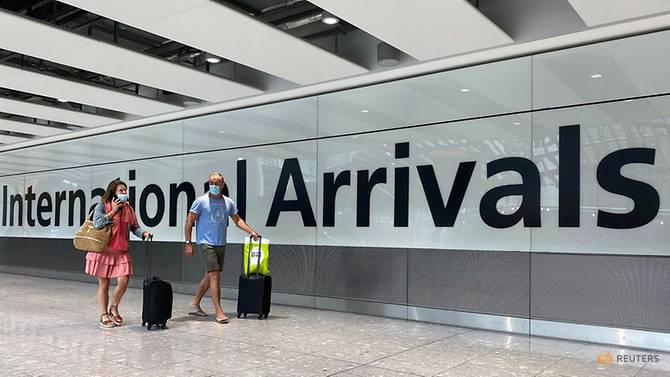More European Union nations ban travel from UK, fearing virus variant

A growing list of European Union nations and Canada barred travel from the U.K. on Sunday and others were considering similar action, in a bid to block a new strain of coronavirus sweeping across southern England from spreading to the continent.
France, Germany, Italy, the Netherlands, Belgium, Austria, Ireland and Bulgaria all announced restrictions on U.K. travel, hours after British Prime Minister Boris Johnson announced that Christmas shopping and gatherings in southern England must be canceled because of rapidly spreading infections blamed on the new coronavirus variant.
Johnson immediately placed those regions under a strict new Tier 4 restriction level, upending Christmas plans for millions.
France banned all travel from the U.K. for 48 hours from midnight Sunday, including trucks carrying freight through the tunnel under the English Channel or from the port of Dover on England’s south coast.
Germany said all flights coming from Britain, except cargo flights, were no longer allowed to land starting midnight Sunday. It didn’t immediately say how long the flight ban would last.
Belgian Prime Minister Alexander De Croo said he was issuing a flight ban for 24 hours starting at midnight “out of precaution.”
Canada announced its own ban Sunday night. Prime Minister Justin Trudeau said in a statement that for 72 hours starting at midnight Sunday, “all flights from the UK will be prohibited from entering Canada.” . Cargo flights were not included in the ban.
The Central American nation of El Salvador, meanwhile, said it would refuse entry to anyone who has visited Britain in the preceding 30 days.
The British government said Johnson would preside at a meeting of the government’s crisis committee, COBRA, on Monday in the wake of the other nations’ measures. They come at a time of huge economic uncertainty for the U.K., less than two weeks before it leaves the EU’s economic structures Dec. 31, and with talks on a new post-Brexit trade relationship still deadlocked.
Johnson said Saturday that a fast-moving new variant of the virus that is 70% more transmissible than existing strains appeared to be driving the rapid spread of new infections in London and southern England in recent weeks. But he stressed “there’s no evidence to suggest it is more lethal or causes more severe illness,” or that vaccines will be less effective against it.
On Sunday, British Health Secretary Matt Hancock added to the alarm when he said “the new variant is out of control.” The U.K. recorded 35,928 further confirmed cases, around double the number from a week ago.
Germany, which holds the rotating EU presidency, called a special crisis meeting on Monday to coordinate the response to the virus news among the bloc’s 27 member states.
The Netherlands banned flights from the U.K. for at least the rest of the year. Ireland issued a 48-hour flight ban.
Italy said it would block flights from the U.K. until Jan.6, and an order signed Sunday prohibits entry into Italy by anyone who has been in the U.K. in the last 14 days.
The Czech Republic imposed stricter quarantine measures from people arriving from Britain.
Beyond Europe, Israel also said it was banning flights from Britain, Denmark and South Africa because those were the countries where the mutation is found.
The World Health Organization tweeted late Saturday that it was “in close contact with U.K. officials on the new COVID19 virus variant and promised to update governments and the public as more is learned.
The new strain was identified in southeastern England in September and has been spreading in the area ever since, a WHO official told the BBC on Sunday. “What we understand is that it does have increased transmissibility, in terms of its ability to spread,” said Maria Van Kerkhove, WHO’s technical lead on COVID-19.
Studies are under way to better understand how fast it spreads and whether “it’s related to the variant itself, or a combination of factors with behavior,” she added. She said the strain had also been identified in Denmark, the Netherlands and Australia, where there was one case that didn’t spread further.
British health authorities said that while the variant has been circulating since September, it wasn’t until the last week that officials felt they had enough evidence to declare that it has higher transmissibility than other circulating coronaviruses.
Patrick Vallance, the British government’s chief scientific adviser, said officials are concerned about the new variant because it contained 23 different changes, “an unusually large number of variants” affecting how the virus binds to and enters cells in the body.
Europe has been walloped this fall by soaring new infections and deaths due to a resurgence of the virus, and many nations have reimposed a series of restrictions to reign in their outbreaks.
Britain has seen over 67,000 deaths in the pandemic, the second-highest confirmed toll in Europe after Italy.
Europe as a whole has recorded nearly 499,000 virus deaths, according to a tally by Johns Hopkins University that experts believe is an undercount, due to limited testing and missed cases.
The European Medicines Agency, meanwhile, is meeting Monday to approve the first COVID-19 vaccine for the European Union’s 27 nations, bringing vaccinations closer for millions of EU citizens.
The vaccine made by German pharmaceutical company BioNTech and American drugmaker Pfizer is already in use in the United States, Britain, Canada and other countries. -Source : AP
File photo : Passengers from international flights arrive at Heathrow Airport, following the outbreak of the coronavirus disease (COVID-19), London, Britain, July 29, 2020. REUTERS/Toby Melville
Dec. 21 , 2020














